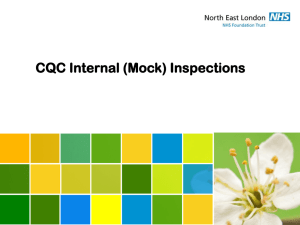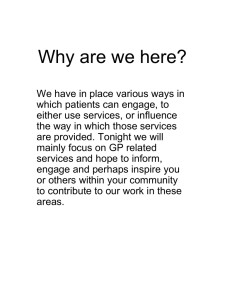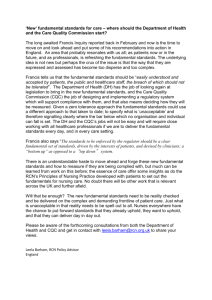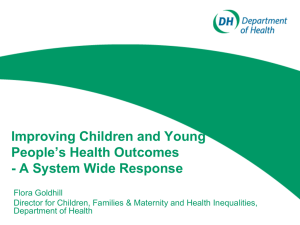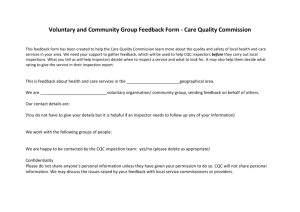Agenda Item: 4 Paper No: CM/06/13/03 MEETING: PUBLIC BOARD
advertisement
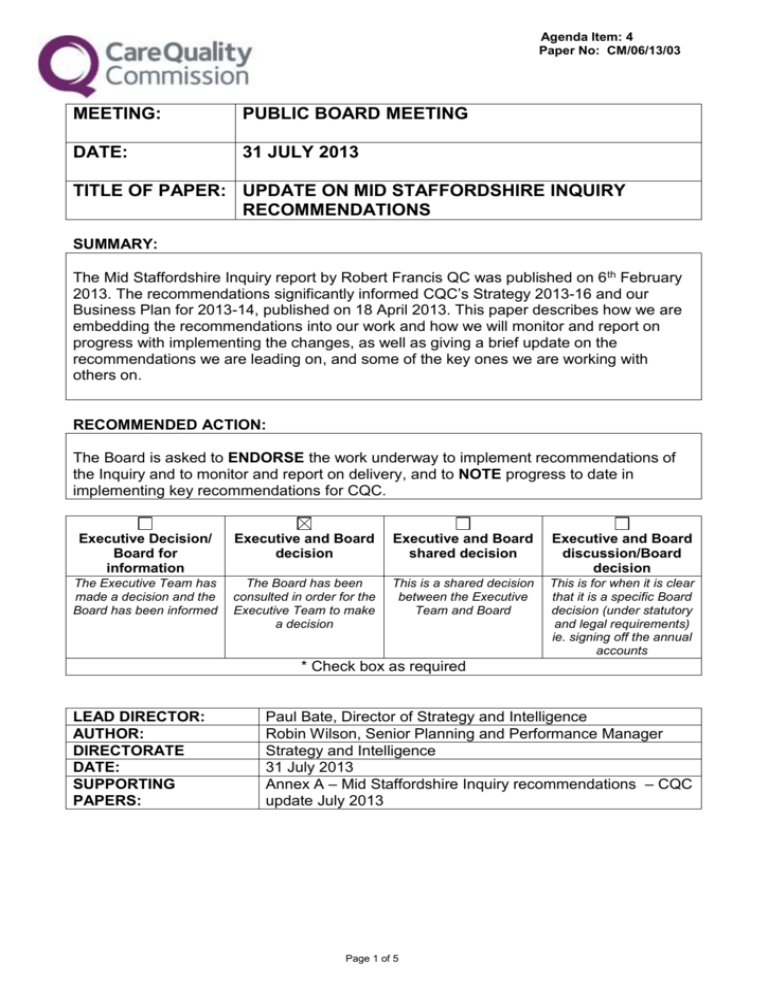
Agenda Item: 4 Paper No: CM/06/13/03 MEETING: PUBLIC BOARD MEETING DATE: 31 JULY 2013 TITLE OF PAPER: UPDATE ON MID STAFFORDSHIRE INQUIRY RECOMMENDATIONS SUMMARY: The Mid Staffordshire Inquiry report by Robert Francis QC was published on 6 th February 2013. The recommendations significantly informed CQC’s Strategy 2013-16 and our Business Plan for 2013-14, published on 18 April 2013. This paper describes how we are embedding the recommendations into our work and how we will monitor and report on progress with implementing the changes, as well as giving a brief update on the recommendations we are leading on, and some of the key ones we are working with others on. RECOMMENDED ACTION: The Board is asked to ENDORSE the work underway to implement recommendations of the Inquiry and to monitor and report on delivery, and to NOTE progress to date in implementing key recommendations for CQC. Executive Decision/ Board for information Executive and Board decision Executive and Board shared decision Executive and Board discussion/Board decision The Executive Team has made a decision and the Board has been informed The Board has been consulted in order for the Executive Team to make a decision This is a shared decision between the Executive Team and Board This is for when it is clear that it is a specific Board decision (under statutory and legal requirements) ie. signing off the annual accounts * Check box as required LEAD DIRECTOR: AUTHOR: DIRECTORATE DATE: SUPPORTING PAPERS: Paul Bate, Director of Strategy and Intelligence Robin Wilson, Senior Planning and Performance Manager Strategy and Intelligence 31 July 2013 Annex A – Mid Staffordshire Inquiry recommendations – CQC update July 2013 Page 1 of 5 Agenda Item: 4 Paper No: CM/06/13/03 GOVERNANCE AUDIT TRAIL: The Executive Team discussed and agreed this paper on 24 July 2013 LINK TO STRATEGIC OBJECTIVES AND BUSINESS PLAN CQC’s Strategy and Business plan both significantly reflect the Inquiry recommendations. IMPLICATIONS FOR NCSC None FINANCIAL IMPACT: Changes are part of a costed budget of baseline and transformation activities, which have been agreed with DH RISK IMPACT: The key risks to delivery of our business plan are captured as part of the Strategic risk register, with mitigations monitored at ET and Programme level, and reported to the Board through regular performance and risk reports. REPUTATION IMPACT: As recorded in the Strategic Risk register. LEGAL IMPLICATIONS: A number of legal implications lie within the recommendations, including the proposed criminal law sanctions, which CQC will pursue with legal advice, and in conjunction with DH. HEALTHWATCH IMPACT: Recommendations about further user involvement in CQC activities (eg: 58) will be the subject of further discussion with HWE. EQUALITY IMPACT ASSESSMENT: Activities to implement the recommendations are part of our Strategy and Business Plan, and an EIA for both these documents was completed and published in April 2013. Page 2 of 5 Agenda Item: 4 Paper No: CM/06/13/03 1. Background 1.1 The Mid Staffordshire NHS Foundation Trust Public Inquiry was announced on 9 June 2010, following a Statement to the House of Commons by the Secretary of State for Health (Andrew Lansley MP). The Inquiry, governed by the Inquiries Act 2005, examined the commissioning, supervisory and regulatory organisations in relation to their monitoring role at Mid Staffordshire NHS Foundation Trust between January 2005 and March 2009. It considered why the serious problems at the Trust were not identified and acted on sooner, as well as the lessons to be learnt for the future of patient care. The Inquiry hearings began on 8th November 2010 and ran for thirty-seven weeks, concluding on 1st December 2011 1.2 Robert Francis QC published his report on 6 February 2013, which included 290 recommendations. The report’s overarching conclusion is that “a fundamental change is needed” to put patients first. The recommendations, as set out in Robert Francis’ press statement at the time, were that the system needed: - - A structure of clearly understood fundamental standards and measures of compliance, accepted and embraced by the public and healthcare professionals, with rigorous and clear means of enforcement Openness, transparency and candour throughout the system Improved support for compassionate caring and committed nursing Strong and patient centred healthcare leadership Accurate, useful and relevant information. 1.3 CQC has taken into account the report’s recommendations, as well as initiatives announced by the Prime Minister, including the creation of a Chief Inspector of Hospitals role. 1.4 CQC published its Strategy ‘Raising standards, putting people first – Our Strategy for 2013 to 2016’, and our Business Plan 2013/14 on 18 April 2013. Both the Strategy and Business plan were shaped following extensive consultation and were significantly informed by the Inquiry recommendations. In our business plan we set out 8 key objectives in 2013-14: Improve assessment and judgement of all the services we regulate by appointing Chief Inspectors Improve the safety and quality of care in NHS acute hospitals and mental health trusts by changing the way we inspect them Identify, predict and respond more quickly to services that are failing or are likely to fail by using data, intelligence and evidence in a more sophisticated and transparent way Improve our understanding of how well different care services work together by introducing specific reviews Work better with other regulators and partners to improve the quality and safety of care Publish better information for the public - including organisation ratings Introduce a more rigorous test for organisations applying to provide care services Build a high-performing organisation that is well run, has an open culture that supports and enables its staff Page 3 of 5 Agenda Item: 4 Paper No: CM/06/13/03 2 Executive Summary The rest of this paper sets out: Progress we have made in taking forward the recommendations we lead How we are embedding the recommendations; tracking and reporting progress How we are working with the DH and other bodies Progress we have made in taking forward the recommendations Since April we have: Appointed the Chief Inspector of Hospitals, Professor Mike Richards, who started on 16 July Appointed the Chief Inspector of Adult Social Care, Andrea Sutcliffe Launched, on 17 June, the first of several planned consultations on changes we are making – the first one covers: o Future regulatory model o Fundamental standards and an outline of how these might be built on by higher ‘expected standards’ o Chief Inspectors’ and specialist team roles o New inspection regime - NHS and independent acute sector (intensive inspections and use of specialist experts and clinicians) o Better information for the public o Ratings – outline proposals o New registration process, including duty of candour o Intelligence led monitoring of information and evidence to identify poor care and reduce risk to service users o Set out intentions to enforce more rigorously Made significant progress in preparing to carry out new in depth inspections of NHS acute hospitals starting from October 2013 including work to establish the teams of inspectors; the approach to selecting those NHS Acute Trusts to be inspected first, and determining how we will evaluate the inspections. Undertaken work with other Monitor, NHS TDA and NHS England on common frameworks, and with professional bodies and service users on developing standards, guidance, and assessment frameworks Built up significant capacity and skills to deliver the programme of change to CQC The report at Annex A gives a progress report on the CQC lead recommendations, key recommendations we are working on with others, and other actions announced by the PM and the Government, arranged by relevant themes in our Transformation programme. We give a due date and a status indicator for each. One recommendation is shown as ‘At risk’ – 16 - because the discussions with the DH around enabling prosecution to take place without a Warning Notice are still ongoing. For the purposes of brevity, we have summarised the recommendations themselves. The numbering is as used in Robert Francis’ report. How we are embedding the recommendations; tracking and reporting progress There are 36 recommendations that we are leading, and there are a further 73 where we are contributing. Page 4 of 5 Agenda Item: 4 Paper No: CM/06/13/03 Our Strategy and business plan are being delivered through a transformation programme to develop our regulatory model with key themes which include: Developing our regulatory model: o Fundamental Standards o Registration o Inspection and assessment o Ratings and publication o Single failure regime o Mental health o Surveillance o Collaboration and Intelligence sharing We have mapped the recommendations into these themes and lead managers for each of the relevant projects are reflecting key recommendations in the plans of their projects, and reporting on progress through regular programme status reporting. This will feed into the quarterly performance and risk reports to the Board and DH Accountability meetings. In addition a special report to the Board in November will give a further progress update by recommendation. This report will be repeated at 6 monthly intervals. Working with the DH and other bodies CQC is a member, together with other key ALBs, of an Assurance Board set up by the DH to ensure collective agreement on the Autumn Patients first and foremost response to Robert Francis’s report and to support policy development on the response. The group is proving a useful forum and has for instance been holding productive discussions on the operation of a single set of quality indicators across the entire NHS system. The autumn consultation response will include both a narrative and a bringing together of actions on each of the 290 recommendations, and CQC will contribute to these as appropriate. 4 Conclusion The Board is asked to NOTE progress on key recommendations CQC is leading and ENDORSE the approach to embedding, tracking and reporting on the Mid Staffordshire Inquiry recommendations. Name: Title: Date Paul Bate Director of Strategy and Intelligence 31 July 2013 Page 5 of 5
